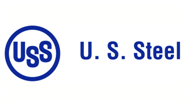Market Segment

October 6, 2020
Burritt: Covid-19 Exposed our “Achilles’ Heel”
Written by Sandy Williams
The COVID-19 pandemic has heightened the United States’ awareness of its economic and security risks, said U.S. Steel President and CEO David Burritt, in an op-ed published by Fox Business. “Key among these risks: the hidden cost of our country’s high dependence on the global supply chain.”
As the coronavirus took hold globally, critical supplies were cut off to the U.S. including personal protective equipment that put the health community and the patients they treat at risk. “That’s because much of the global PPE supply chain was sourced from factories in China and the massive increase in global demand created shortages that we could not control,” said Burritt. “The pandemic exposed our ‘Achilles’ Heel’ when we were confronted by disruptions to overseas manufacturing and shipping of high-demand goods.
“America’s decline as a manufacturing leader is especially acute in the global production of steel,” he said. “Today, three-quarters of the world’s steel is produced outside of the U.S. and most of that is controlled by foreign governments. While America was once the world powerhouse steel producer, China has assumed that title — and not by a little.”
China has a reported 1.2 billion tons of capacity and is expected to produce one billion tons of steel in 2020—50 times more than U.S. Steel’s production, said Burritt.
“Steel is the backbone of infrastructure modernization and manufacturing across a wide array of sectors — from bridges and buildings to autos and shipbuilding, which is key to the national defense. America’s dependency on foreign-controlled supply chains means our production lines are at the mercy of those who may not have our best interests in mind. When the U.S. lacks the ability to control its access to needed materials — what it needs, when and where it needs them, and at what cost — bad things can happen.”
Burritt urges the administration to make investments in infrastructure and continue its “Buy America” focus. Doing so, he says, will revitalize the supply chain and create jobs that will support the economy.
“A domestic supply chain consisting of American made equipment, with maximum domestic content, gives America more control and certainty,” said Burritt. “When the unthinkable happens, production lines in vital industries will remain open and our nation’s economic engine will continue to fire on all cylinders.
“If our elected leaders work together now to establish the right policies and incentives, we can regenerate our nation’s manufacturing muscle, restore our global economic leadership, and power America’s future economic growth.”







